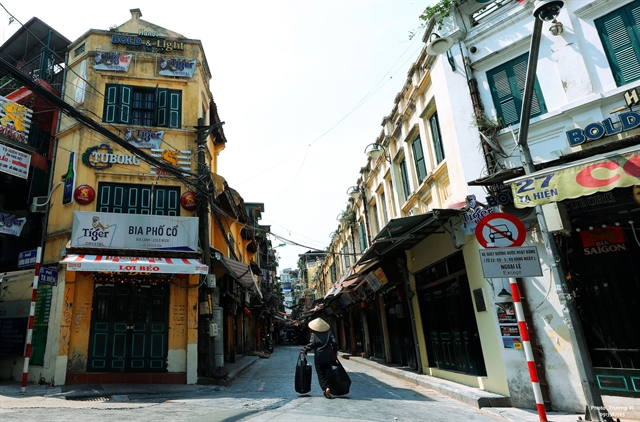 Society
Society


|
| Tạ Hiện Street, the usually busy backpacker street with bars and fast food stalls in the Old Quarter of Hà Nội is deserted during the lockdown that began at the end of July. — VNS Photo Trương Vị |
HÀ NỘI — Hà Nội's People’s Committee on Friday afternoon officially announced its decision to extend stringent citywide social distancing orders for 15 days until 6am on August 23.
According to dispatch No.18, signed by Chairman Chu Ngọc Anh, after 14 days of heavy restrictions in line with the Government’s Directive 16 that began at 6am Saturday, July 24 and set to expire at 6am Saturday, August 7, the city had attained “certain results”, Anh said.
However, the outbreak in the city as well as across the country remains “unpredictable and complicated,” with many infections found in the community without clear sources and numerous cases displaying no symptoms, he added.
The capital city has logged 1,800 cases in the fourth wave of infections starting in late April, half of which were found during the lockdown period with about 60-70 cases new cases registered each day.
During a press briefing held the same day, a health official said the health sector will take advantage of the lockdown period to ‘filter’ out all hidden COVID-19 cases in the community.
Under the social distancing order, non-essential businesses continue to remain closed, people are not allowed to go outside except for essential purposes like buying food or medical emergencies. Public transport also remains halted.
The dispatch noted that many members of the public and organisations/companies have not strictly abided by the social distancing rules and that crowding still occurred from time to time in markets and on the streets. The presence of the highly-transmissible Delta variant threatens to shatter the city’s COVID-19 prevention and control efforts, he said.
The city leader asked for absolute compliance with social distancing orders, separating household from household and individual from individual.
Companies, businesses and agencies in the city should continue to arrange for their employees to work from home and only go to work in truly necessary cases such as members of the armed forces or people handling confidential documents and all under the monitoring of the company and/or local authorities.
The chairman noted that the success of the COVID-19 fight, other than the “robust involvement” of the administration, is predicated on the self-discipline and compliance and support of the people and society in obeying social distancing rules.
For green zones (COVID-19 free areas), residents should remain proactive and not complacent in preventing the disease, but stand ready to respond to any emerging incidents.
For orange zones – high-risk areas like factories, workplaces, markets, hospitals or other medical facilities – each unit must have a prevention and control plan ready and local authorities will inspect and only permit them to operate once the units satisfy the COVID-19 safety criteria.
For red zones or blockaded/quarantined areas, local authorities can decide to impose stronger measures to make sure no spread of the virus will occur inside these zones and to contain the outbreak as soon as possible.
Testing and treatment
The city leader also asked for stock to be taken of the city’s testing capacity, as well as for the mobilisation of all capable units to help expand testing capacity.
Health agencies and local authorities have been tasked with taking the initiative in conducting rapid antigen testing based on their assessment of outbreaks and clusters, to act fast and flexibly to avoid missing virus carriers, and start to offer guidance for the public to take samples by themselves under the supervision of healthcare workers.
The health authorities have also been asked to prepare for maximum capacity scenarios – with regards to the treatment of COVID-19 patients, especially ensuring enough oxygen, ventilators and beds.
Healthcare centres have been told to classify asymptomatic and symptomatic patients and sort them into the appropriate treatment units.
Suitable apartment buildings, educational institutions, and construction projects could be requisitioned and repurposed to act as treatment facilities for asymptomatic patients (30,000 beds and up to 50,000 beds if necessary).
Anh also asked for quicker vaccinations but in a safe manner, providing sufficient instructions for people before their vaccine appointments.
Local authorities and relevant sectors must have plans and arrangements in place to avoid disruptions to the supply of goods to the city, market instability, shortages or hoarding and ensure the safe circulation and supply of food and essentials for all people, especially in blockaded areas, guaranteeing that no one is left wanting.
Trần Thị Phương Lan, Acting Director of Hà Nội’s Department of Industry and Trade, said the department had told distribution chains to stock up three times the normal amount of goods (up to VNĐ194,000 billion in value).
Lan said given that there are some markets and supermarkets that have been closed due to COVID-19 infections, mobile units have been set up to provide essential products for local residents. — VNS




